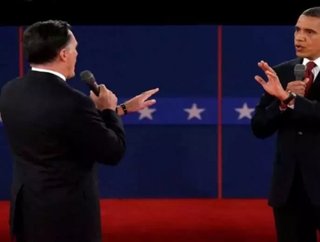Presidential Debate Highlights 'Agenda Gap' on Energy

In a heated exchange in the second presidential debate, the focus was on who would do the most for the coal industry and who would drill even more for oil and gas on public land. In stark contrast to this discussion, 100 grassroots organizations with 1.7 million members nationwide today issued a "First 100 Days" clean energy agenda for the next President of the United States. The American Clean Energy Agenda focuses on reducing our reliance on coal, oil, natural gas, and nuclear power, and supporting rapid expansion of renewable energy.
The first-100-days clean energy agenda is an outgrowth of the American Clean Energy Agenda project, which was unveiled in June 2012 and initially supported by 36 U.S. citizen organizations with more than 1.1 million members nationwide.
SEE OTHER TOP STORIES IN THE ENERGY DIGITAL CONTENT NETWORK
The US Army's Great Drive for Renewable Power
India set to replicate its IT sectors success in solar energy
Read more in Energy Digital's October Issue
CSI President Pam Solo said: "In poll after poll that we've conducted, it's clear the public supports a truly clean energy future. The public favors energy sources that are not water intensive and do not pose health risks or require unending subsidies from public funds. They understand that it cannot happen overnight and that it will only happen when serious policy making replaces public posturing. The American Clean Energy Agenda is a call for decisive leadership toward a truly clean energy future."
Heather White, chief of staff, Environmental Working Group, said: "It's not the country that's on the wrong track, it's the debate over our energy future. We've heard a lot of talk about a gender gap, but Tuesday night in Hempstead we saw an 'agenda gap' on energy policy. No matter who is elected President, Americans want a clean energy path that protects their communities' health and safety, conserves and protects their water resources and is affordable and reliable. The next President must act quickly to get us there in the first 100 days of his Administration."
The first-100-days clean energy agenda calls on the next U.S. President to:
-
First, work to establish a much-needed national water policy in order to avert or mitigate the current and future water scarcity problems that face the nation if today's electric generation mix remains unchanged or becomes even more dependent on fossil fuel-fired and nuclear power. Power generation in the U.S. currently accounts for 41 percent of all fresh water withdrawals.
-
Secondly, the President must establish sustainability criteria to guide the choice and deployment of new electricity generating technologies. Americans require and support a power system that is affordable and reliable, consumes modest volumes of water, substantially reduces public health impacts, improves environmental quality and addresses climate change. The incoming administration should work to eliminate all public support for energy technologies that do not meet these criteria.
-
Third, the next administration must begin to make energy efficiency and non-combustion-based renewable energy technologies the core of the electric power system and adopt policies and programs that lead to eventual replacement of fossil fuel-fired and nuclear power plants.
-
Fourth, and finally, the next President must make it a priority to ensure that the United States becomes the acknowledged global leader in job-creating clean energy technologies and in confronting the challenge of climate change.
A related April 25, 2012 ORC International survey conducted for CSI found:
-
More than three out of four Americans (76 percent) – including 58 percent of Republicans, 83 percent of Independents, and 88 percent of Democrats -- think that the United States should move to a sustainable energy future through "a reduction in our reliance on nuclear power, natural gas and coal, and instead, launch a national initiative to boost renewable energy and energy efficiency."
-
However, the bipartisan support for clean energy does not mean that Americans think that Washington, D.C., is on the same page with them. More than three out of four Americans (77 percent) – including 70 percent of Republicans, 76 percent of Independents, and 85 percent of Democrats -- believe that "the energy industry's extensive and well-financed public relations, campaign contributions and lobbying machine is a major barrier to moving beyond business as usual when it comes to America's energy policy."
SOURCE Civil Society Institute; and Environmental Working Group, Washington, D.C.
DOWNLOAD THE ENERGY DIGITAL IPAD APP






